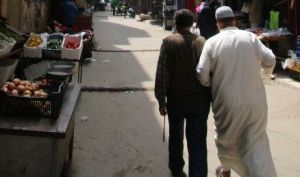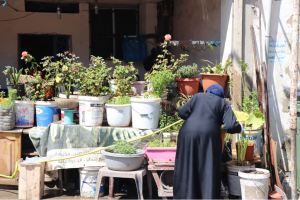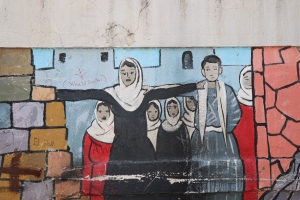How do refugees themselves experience and conceptualise Southern-led responses developed ‘on their behalf’? Building on her research in Lebanon, Cuba and Algeria vis-a-vis Palestinian and Sahrawi refugees’ participation in a Cuban scholarship programme established in the 1960s, this question has long been at the core of Prof. Elena Fiddian-Qasmiyeh’s work, and continues to be central to her ongoing ERC-funded project examining Southern Responses to Displacement from Syria. In this piece, drawn from her book, South-South Educational Migration, Humanitarianism and Development: Perspectives from the Caribbean, North Africa and the Middle East, Prof. Fiddian-Qasmiyeh examines the ways that Palestinian and Sahrawi refugees perceive the Cuban state’s diverse motivations for supporting refugees from the Middle East, including their reflections on the relationship between ideological, political, humanitarian and human modes of responding to displacement. Prof. Fiddian-Qasmiyeh traces the rationale and implications of the Cuban scholarship programme for refugees from the Middle East, highlighting key themes that are relevant to her ongoing research into contested conceptualisations of diverse forms of ‘Southern led responses’ to displacement from Syria, including responses developed by states and organisations from the ‘Global South’, and those implemented by refugees themselves through processes of ‘refugee-refugee humanitarianism‘.
If you find this piece of interest please see the suggested reading at the end of this blog.
This blog was posted on 8th April 2019
Exploring refugees’ conceptualisations of Southern-led humanitarianism
By Prof Elena Fiddian-Qasmiyeh, Principal Investigator, Southern Responses to Displacement Project
With displacement primarily being a Southern phenomena – circa 85-90% of all refugees remain within the ‘global South – it is also the case that responses to displacement have long been developed and implemented by states from the South (a construct we are critically examining throughout the Southern Responses to Displacement project – see here). Some of these state-led responses to displacement have been developed and implemented within the framework of what is known as ‘South-South Cooperation’. This framework provides a platform from which states from the global South work together to complement one another’s abilities and resources and break down barriers and structural inequalities created by colonial powers. It can also be presented as providing an alternative mode of response to that implemented by powerful Northern states and Northern-led organisations (see here).
An example of this type of South-South Cooperation, often driven by principles of ‘internationalism,’ can be found in the international scholarship programmes and schools established by a number of Southern states to provide primary, secondary and university-level education for refugees from across the Middle East and North Africa. In particular, since the 1960s, Cuba has provided free education through a scholarship system for Palestinian refugees based in camps and cities across the Middle East following the Nakba (the catastrophe) and for Sahrawi refugees who have lived in desert-based refugee camps in Algeria since the mid-1970s.
In line with the Southern Responses to Displacement project, which aims to purposefully centralise refugees’ own experiences of and perspectives on Southern-led initiatives to support refugees from Syria, throughout my previous work I have examined how Palestinian and Sahrawi refugees have conceptualised, negotiated or, indeed, resisted, diverse programmes that have been developed and implemented ‘on their behalf.’ While long-standing academic and policy debates have addressed the relationship between humanitarianism, politics and ideology, few studies to date have examined the ways in which refugee beneficiaries – as opposed to academics, policymakers and practitioners – conceptualise the programmes which are designed and implemented ‘for refugees’. The following discussion addresses this gap precisely by centralising Palestinian and Sahrawi graduates’ reflections on the Cuban scholarship programme and the extent to which they conceptualise political and ideological connections as being compatible with humanitarian motivations and outcomes.
This blog, and my previous work (here and here) examines how Palestinian and Sahrawi refugees have understood the motivations, nature and impacts of Cuba’s scholarship system through reference to identity, ideology, politics and humanitarianism. Based on my interviews with Palestinians and Sahrawis while they were still studying in Cuba, and with Palestinian and Sahrawi graduates whom I interviewed after they had returned to their home-camps in Lebanon and Algeria respectively, this short piece examines the complex dynamics which underpin access to, as well as the multifaceted experiences and outcomes of, the scholarship programme on both individual and collective levels.
Balancing ‘the humanitarian’
Although both Palestinian and Sahrawi interviewees in Cuba and Sahrawi graduates in their Algeria-based home-camps repeatedly asserted the humanitarian nature of the Cuban scholarship programme, precisely what this denomination of ‘humanitarianism’ might mean, and how compatible it could be given the ideological and political links highlighted by Palestinian graduates whom I interviewed in a range of refugee camps in Lebanon, requires further discussion.
The contemporary international humanitarianism regime is habitually equated with the principles of humanity, impartiality, neutrality and independence (Ferris 2011: 11), and a strict separation is firmly upheld by Western humanitarian institutions between morality and politics (as explored in more detail by Pacitto and Fiddian-Qasmiyeh 2013). However, many critics reject the assertion that humanitarianism can ever be separated from politics, since ‘“humanitarianism” is the ideology of hegemonic states in the era of globalisation’ (Chimni 2000:3). Recognising the extent to which the Northern-led and Northern-dominated humanitarian regime is deeply implicated in, and reproduces, ‘the ideology of hegemonic [Northern] states’ is particularly significant since many (Northern) academics, policymakers and practitioners reject the right of Southern-led initiatives to be denominated ‘humanitarian’ in nature on the basis that such projects and programmes are motivated by ideological and/or faith-based principles, rather than ‘universal’ humanitarian principles.
Palestinians who at the time of our interviews were still studying in Cuba, in addition to those who had more recently graduated from Cuban universities, medical and dentistry schools and had ‘returned’ to their home-camps in Lebanon, repeatedly referred to ‘ideology’, ‘politics’, ‘humanitarianism’ and ‘human values’ when describing the Cuban scholarship programme. Yet, while they maintained that Cuba’s programme for Palestinian refugees is ‘humanitarian’ in nature, Palestinian graduates offered different perspectives regarding the balance between these different dimensions, implicitly and at times explicitly noting the ways in which these overlap or are in tension.
Importantly, these recurrent concepts are to be contrasted with the prevalent terminology and frames of reference arising in Sahrawi refugees’ accounts of the Cuban educational programme. Having also had access to the Cuban educational migration programme, Sahrawi graduates’ accounts can perhaps be traced to the continued significance of Spanish – the language learned and lived (following Bhabha 2006:x) in Cuba – amongst graduates following their return to the Sahrawi refugee camps, where Spanish is the official language used in the major camp-based Sahrawi medical institutions.
As such, in interviews and in informal conversations in the Sahrawi camps, Cuban-educated Sahrawis (commonly known as Cubarauis) consistently used the Spanish-language term solidaridad (solidarity) to define both the nature of the connection between the Sahrawi people and Cuba, and the nature of the scholarship programme; they also regularly cited Cuban revolutionary figures such as José Martí and Fidel Castro. In contrast, no such quotes were offered by the Palestinian graduates I interviewed in Lebanon, even if the significance of Fidel Castro and Ché Guevara was noted by many during our interviews in Cuba.
Explaining his understanding of the basis of the scholarship programme for Palestinians, Abdullah elaborated that this was:
‘mainly prompted because Cuban politics is based upon human values and mutual respect, and in particular upon socialism, which used to be very prominent in the Arab world during that time.’
In turn, referring to the common visions uniting both parties and facilitating Cuba’s scholarship programme for Palestinian refugees, Hamdi posited that:
‘Certain ideological and political commonalities contributed to this collaboration between the Cuban government and the PLO. However, the humanitarian factor was present in these negotiations.’ (Emphasis added)
These accounts reflect the extent to which ideology and humanitarianism are both recognised as playing a key role in the scholarship programme, and yet Hamdi’s usage of the term ‘however’, and his reference to ‘the humanitarian factor’, demonstrate an awareness that a tension may be perceived to exist between ideology/politics and humanitarian motivations.
Indeed, rather than describing the programme as a humanitarian programme per se, eight of my interviewees offered remarkably similar humanitarian ‘qualifiers’: the Cuban education programme is described as having ‘a humanitarian component’ (Marwan), ‘a humanitarian dimension’ (Younis), a ‘humanitarian aspect’ (Saadi), and ‘humanitarian ingredients’ (Abdel-Wahid); while other interviewees argued that it is ‘a mainly humanitarian system’ (Nimr) which ‘carr[ies] humanitarian elements’ (Hamdi) and ‘shares its humanitarian message in spite of the embargo [against Cuba]’ (Ibrahim).
As exemplified by these qualifiers, Palestinians who participated in this programme themselves recognise that humanitarianism was not the sole determining justification for the initiative, but rather that it formed part of the broader Cuban revolution and a particular mode of expressing support for other liberation movements, including the Palestinian cause.
In terms of weighting these different motivating and experiential elements, Mohammed argued that the ‘humanitarian aspect outweighs the ideological one’, emphasising the ‘programme’s strong humanitarian aspect’. In turn, Ahmed and Nimr declared that the Cuban scholarships were offered ‘without conditions or conditionalities’ and without ‘blackmailing Palestinians to educate them’.
These references are particularly relevant when viewed alongside critiques of neoliberal development programmes and strategies which have often been characterised by ‘tied aid’ or diverse economic, socio-political and gendered conditionalities which require beneficiaries to comply with Northern-dominated priorities vis-à-vis ‘good governance’ – all of which are, in effect, politically and/or ideologically driven.
Concurrently, Khalil argued that the programme is ‘humanitarian if used correctly’, thereby drawing attention to the extent to which the nature of the programme transcends either Cuba’s or the PLO’s underlying motivating factors per se, and is, rather, characterised both by the way in which the programme has been implemented since the 1970s, and its longer-term impacts.
With reference to the former, claims regarding the absence of conditionalities on Cuba’s behalf must be viewed alongside the extent to which Palestinians could only access the scholarships if they were affiliated with specific Palestinian factions (as I explore in the book): can the programme be ‘truly’ humanitarian if individual participation has historically been contingent upon an official declaration of ideological commonality with a leftist faction and/or the Cuban internationalist project?
With universality, neutrality and impartiality being three of the core ‘international’ humanitarian principles, a tension is apparent from the perspective of ‘the Northern relief elite’ who arguably monopolise the epithet humanitarian (Haysom, cited in Pacitto and Fiddian-Qasmiyeh 2013: 6). Indeed, although José Martí’s humanitarian principle to ‘compartir lo que tienes, no dar lo que te sobra’ (‘to share what you have, not what is left over’) has historically guided many of the Cuban state’s revolutionary programmes on national(ist) and international(ist) levels, precisely who Cuba should share with (on a collective) has often been geopolitically framed. Whilst designed to overcome the historical legacy of diverse exclusionary processes in Cuba, the programme could itself be conceptualised as being guided by an ideological commitment to inclusion with exclusionary underpinnings.
The imposition of a hegemonic discourse leaves people out, primarily on ideological grounds. Ideological repression means that everybody who questions the regime in a fundamental way is basically left out in the dark. There is a creation of boundaries between Self and Other that leaves very little room for fundamental critique. However, the existence of a hegemonic discourse, and demands for students to publicly assert their affiliation to an official ideological stance, whether this refers to Cuban or Palestinian discourses, should not necessarily be equated with the exclusion of individuals and groups who do not share particular opinions and beliefs.
In the case explored in this blog and in the book it is based on, a distinction can therefore perhaps be usefully made between the collective basis of scholarships primarily being offered to groups and nations with political and ideological bonds to Cuba’s revolutionary project, and the extent to which individual Palestinian students have arguably negotiated the Cuban system and the factional system alike to maximise their personal, professional and political development. To achieve the latter, individuals have developed official performances of ideological loyalty to access and complete their university studies in Cuba, whilst ultimately maintaining or developing political and ideological opinions, and critiques, of their own.
With reference to the broader outcomes of the programme, is it sufficient to announce, as seven Palestinian graduates did, that the project was ‘humanitarian’ in nature precisely because the beneficiaries of the scheme were refugees, and the overarching aim was to achieve professional self-sufficiency in refugee camps?
In effect, and as explored in my other research (here) Cuba’s programme might appear to fall under the remit of a developmental approach, rather than being ‘purely’ humanitarian in nature, precisely due to the official aim of maximising self-sufficiency as opposed to addressing immediate basic needs in an emergency phase (with the latter more readily falling under the remit of ‘humanitarian’ assistance).
Nonetheless, Cuba’s aim to enhance refugees’ self-sufficiency corresponds to the UNHCR’s well-established Development Assistance to Refugees approach, and programmes supporting medium- and long-term capacity building are particularly common in protracted refugee situations. At the same time, it could be argued that the distinction between humanitarianism and development is immaterial given that the rhetoric of solidarity underpins all of Cuba’s internationalist projects, whether in contexts of war or peace, and, furthermore, since Cuba has offered scholarships not only to refugees but also to citizens from across the Global South.
Related to the programme’s reach to citizens and refugees alike, and simultaneously to the nature of the connection between humanitarianism and politics, Younis drew attention to another pivotal dimension: ‘although the educational system had a humanitarian dimension, I don’t think it is possible to separate the human being from politics’. Cuba’s political (in essence, socialist) commitment to the ‘human being’ was reasserted throughout the interviews, with Saadi, for instance, referring to Cuba’s prioritisation of the ‘relationship between a human being and a fellow human being’, and Khalil explaining that Cuba had adopted ‘the cause of the human being, and that’s why it supported Palestinians in their struggle’.
While critiques of Northern-led human rights discourses have been widespread, and such critiques have often paralleled or influenced critical analyses of humanitarianism (as I explore elsewhere), in their responses Palestinian graduates invoked an alternative approach to supporting the rights of human beings.
By conceptualising Cuba’s commitment to human beings as being inherently connected to politics, graduates, by extension, also highlighted that politics cannot be separated from approaches geared towards supporting humanity, whether external analysts consider that such approaches should be labelled ‘development’ or ‘humanitarianism’. Whilst absent from the terminology used by Palestinian graduates, it can be argued that the notion of solidarity centralised in Cubaraui (and Cuban) accounts captures precisely these dimensions of Cuba’s internationalist approach.
Moving Forward
These dynamics – including conceptualisations of the relationship between politics, ideology, and humanitarianism; of short-, medium- and long-term responses to displacement; and how refugees themselves negotiate and conceptualise responses developed by external actors ‘on their behalf’ – will continue to be explored throughout the Southern Responses to Development from Syria project. This ongoing research project aims, amongst other things, to examine how people displaced from Syria – Syrians, Palestinians, Iraqis, Kurds … -, experience and perceive the different forms of support that ‘Southern’ states, civil society groups, and refugees themselves have developed in Lebanon, Jordan and Turkey since the outbreak of the Syrian conflict in 2011. This will include reflections on how refugees conceptualise (and resist) both the construct of ‘the South’ itself and diverse responses developed by states such as Malaysia and Indonesia, but also by different groups of refugees themselves. The latter include Palestinian refugees whose home-camps in Lebanon have been hosting refugees from Syria, but also whose educational experiences in Cuba mean that they are amongst the medical practitioners who are treating refugees from Syria, demonstrating the complex legacies of the Cuban scholarship programme for refugees from the Middle East.
*
For more information on Southern-led responses to displacement, including vis-à-vis South-South Cooperation, read our introductory mini blog series here, and the following pieces:
Carpi, E. (2018) ‘Empires of Inclusion‘
Fiddian-Qasmiyeh, E. (2019) ‘Looking Forward. Disasters at 40′
Fiddian-Qasmiyeh, E. (2018) Histories and spaces of Southern-led responses to displacement
Fiddian-Qasmiyeh, E. (2018) Internationalism and solidarity
Fiddian-Qasmiyeh, E. (2018) Refugee-refugee humanitarianism
Fiddian-Qasmiyeh, E. (2014) The Ideal Refugees: Islam, Gender, and the Sahrawi Politics of Survival
Fiddian-Qasmiyeh, E. and Daley, P. (2018) Conceptualising the global South and South–South encounters
Featured Image: A mural outside a school in Baddawi camp, N. Lebanon. Baddawi has been home to Palestinian refugees from the 1950s, and to refugees from Syria since 2011 (c) E. Fiddian-Qasmiyeh, 2017



